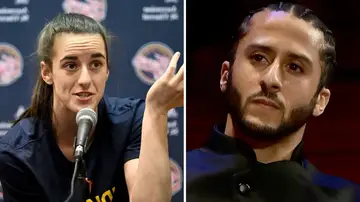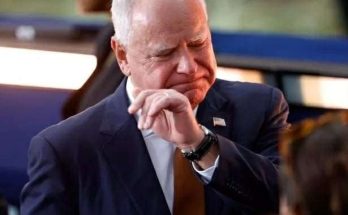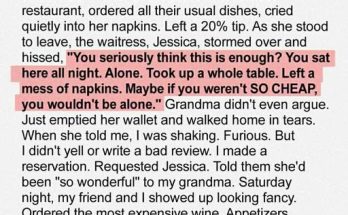In an unexpected move that has sent shockwaves through both the sports and business worlds, Caitlin Clark, one of the brightest stars in women’s basketball, has turned down a $400 million endorsement deal from Nike. The reason for her rejection? Her disapproval of Nike’s ongoing partnership with Colin Kaepernick, whom she referred to as “that Kaepernick clown.” This bold decision by Clark has ignited intense debate and highlighted the intersection of sports, politics, and personal values in the realm of athlete endorsements.
The $400 million deal from Nike was poised to be one of the largest endorsements in sports history. It included a series of high-profile advertisements, exclusive product lines, and significant involvement in Nike’s global marketing campaigns. For Caitlin Clark, a rising star in the WNBA with the Indiana Fever, this deal represented a massive financial opportunity and a chance to further elevate her profile on the international stage.
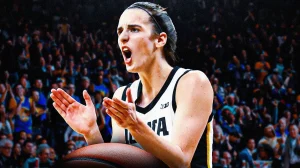
However, Clark’s rejection of the offer was as swift as it was surprising. In a public statement, she made it clear that her values and beliefs played a critical role in her decision. “While I appreciate Nike’s interest in me and their generous offer, I cannot align myself with a company that supports Colin Kaepernick. I believe in standing by my principles, and I do not support what he stands for,” Clark stated.
Caitlin Clark’s journey to the top of women’s basketball has been marked by exceptional talent, hard work, and determination. From her high school days, where she shattered records and showcased her scoring prowess, to her standout performances at the University of Iowa, Clark has consistently impressed both fans and analysts. Her college career was distinguished by remarkable statistics, including an average of 27 points, 8 assists, and 6 rebounds per game, earning her numerous accolades and a reputation as one of the most exciting players to watch.
Clark’s transition to the WNBA has been equally impressive. As a key player for the Indiana Fever, she has quickly become one of the league’s most talked-about athletes, known for her dynamic play and leadership on the court. Her marketability extends beyond her basketball skills, as she actively engages with fans on social media and participates in community service, making her a beloved figure in the sports community.
Colin Kaepernick, a former NFL quarterback, became a polarizing figure when he began kneeling during the national anthem to protest police brutality and racial injustice. His actions sparked a nationwide debate, drawing both support and criticism. Nike’s decision to feature Kaepernick in their “Just Do It” campaign further fueled the controversy, leading to boycotts and praise from different segments of the public.
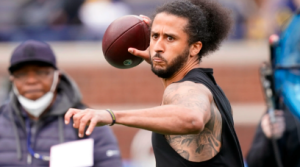
Kaepernick’s stance has made him a symbol of resistance and activism for many, while others view his actions as disrespectful to the flag and the military. Nike’s endorsement of Kaepernick aligned the brand with social justice issues, attracting a specific demographic but alienating others.
The public reaction to Caitlin Clark’s rejection of the Nike deal has been intensely polarized. Supporters of Clark praised her for standing by her beliefs, highlighting the importance of personal integrity over financial gain. “Caitlin Clark is a true role model. It’s refreshing to see someone who prioritizes their values over money,” tweeted one fan.
Conversely, critics argue that Clark’s comments about Kaepernick are disrespectful and divisive. “Everyone is entitled to their opinion, but calling Kaepernick a ‘clown’ is uncalled for and diminishes the important issues he’s fighting for,” commented a sports analyst. The backlash underscores the deep divisions within the sports community and society at large regarding social and political activism.
For Caitlin Clark, rejecting the $400 million deal is a bold statement that could have lasting implications for her career. Financially, the deal would have provided significant resources and security. However, Clark’s decision underscores her commitment to her personal beliefs and public image.
Colin Kaepernick, accustomed to both admiration and criticism, has yet to respond publicly to Clark’s comments. His activism and involvement with Nike continue to be significant, and this incident is unlikely to impact his efforts substantially. However, it does highlight the challenges he faces as a prominent advocate for social justice.
Athlete endorsements have long been a powerful tool for brands to connect with consumers and enhance their market presence. The proposed partnership between Clark and Nike was intended to leverage her rising influence and align her with the brand’s progressive image.
In recent years, there has been a growing recognition of the value of authenticity in endorsements. Consumers increasingly favor brands and figures that align with their own beliefs and values. Clark’s rejection of the deal reflects this trend, emphasizing the importance of staying true to one’s principles in an age where social issues are at the forefront of public discourse.
As Caitlin Clark continues her career, her decision to reject the deal with Nike will likely become a defining moment. It positions her as an athlete who values integrity and personal beliefs over financial gain, potentially attracting other brands that align with her values.
For Nike, this incident may prompt a reassessment of their endorsement strategies. While their partnership with Kaepernick has been controversial, it has also been successful in engaging a specific audience. The brand will need to navigate these complexities carefully as they move forward.
Caitlin Clark’s rejection of a $400 million deal from Nike, citing her disapproval of Colin Kaepernick, is a bold and unprecedented move in the world of sports endorsements. It highlights the complex interplay between personal values, professional opportunities, and public perception.
While the financial impact of rejecting such a lucrative deal is significant, Clark’s decision underscores her commitment to staying true to her principles. As the sports world continues to navigate the challenges of activism and professionalism, Clark’s choice sets a powerful example of integrity and authenticity.
In a time when the lines between sports, politics, and social issues are increasingly blurred, Caitlin Clark’s stance reminds us that the choices athletes make extend beyond the court and can influence public discourse in profound ways. The sports community will be watching closely, hoping for Clark’s continued success on and off the court.
Ruth Langsford poured cold water over suggestions she and Eamonn Holmes could remain close in a resurfaced clip.

The former couple spoke about whether they believe it’s the correct thing to do to stay friends with an ex on This Morning back in 2018.
The Loose Women host was crystal clear that once a relationship had ended, there’s little point in staying in touch.
It has been claimed that the divorcing TV pair could stay in each other’s lives, despite their shock announcement earlier this summer.

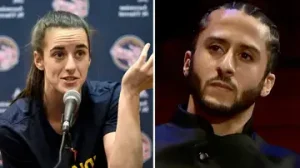
The TV presenters, who are both 64, met in 1997 through a mutual friend but their marriage has collapsed and it May it was revealed that they have split up.

It has since been alleged that Ruth found messages between her husband and another woman on a laptop.

She has been left “hurt” after finding out her husband is being consoled by Katie Alexander after she struck up a friendship with Eamonn over the past couple of years and he is said to have taken her to a safari park, a Manchester United game and a Beyonce gig.
It seems there’s no going back and the clues were there during the segment on This Morning six years ago. Ruth remarked that it was “very nice” that people had managed to stay friends after a splitting and said: “Whether you think it’s a good idea to remain friends with your ex. We want to hear your stories.”
The Irishman asked her: “We want to hear your view Ruth. What do you think?” Bluntly, she said: “I think I’ve made that quite clear – no, because they’re my exes. If I met them in a room I’d be perfectly friendly, but I don’t need them in my life.” Eamonn then butted in, sayig: “Is it because they don’t like you? Is that why? Do they not want to be in touch with you?”
After some awkward laughter, Ruth hit back and said: “They all love me. I just, you know… I feel that’s done. Thank you very much, very nice. Yes.” It’s believed that both Eamonn and Ruth are keen to finalise their divorce soon, but there’s still a lot to sort out behind the scenes.
At last month’s TRIC awards, Eamonn was quizzed about the future of his relationship with Ruth and said: “It’s too early to say but I hope we can still be friends.” Eamonn and Ruth’s romance began in 1997 after being introduced by friends, leading to over a decade of dating before Eamonn proposed.
The couple tied the knot in 2010, but they hadn’t been seen together publicly for two years prior to their split and in May they stunned fans by confirming it is all over in a statement. A friend of Ruth said: “Ruth was hurt when she learned about Eamonn’s friendship with another woman but she is strong and she will be back soon with a smile on her face, putting her best foot forward, as she always does. She needs a bit of time to regroup after everything that’s gone on.”
